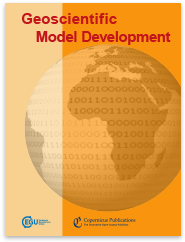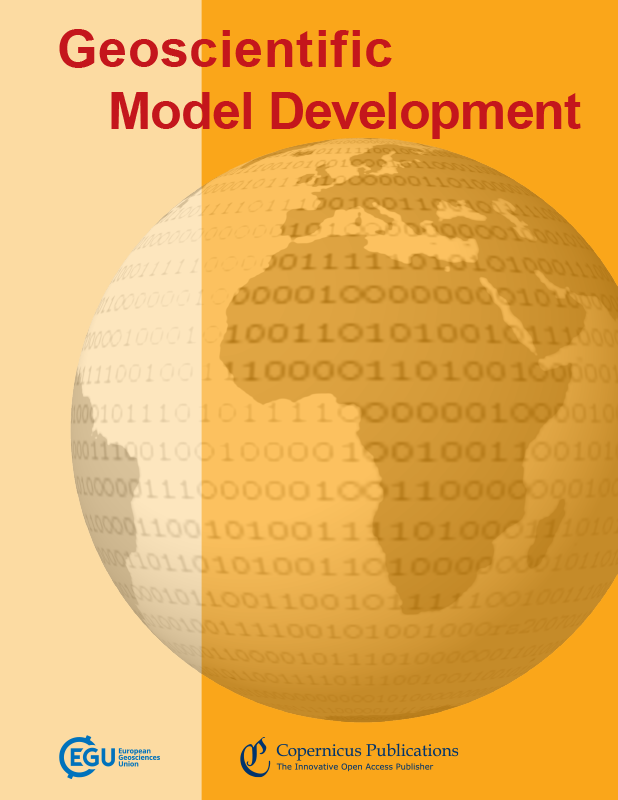
Executive editors: David Ham, Juan Antonio Añel, Astrid Kerkweg, Min-Hui Lo, Richard Neale, Rolf Sander & Paul Ullrich
eISSN: GMD 1991-9603, GMDD 1991-962X
Geoscientific Model Development (GMD) is a not-for-profit international scientific journal dedicated to the publication and public discussion of the description, development, and evaluation of numerical models of the Earth system and its components. The following manuscript types can be considered for peer-reviewed publication:
- geoscientific model descriptions, from statistical models to box models to GCMs;
- development and technical papers, describing developments such as new parameterizations or technical aspects of running models such as the reproducibility of results;
- new methods for assessment of models, including work on developing new metrics for assessing model performance and novel ways of comparing model results with observational data;
- papers describing new standard experiments for assessing model performance or novel ways of comparing model results with observational data;
- model experiment descriptions, including experimental details and project protocols;
- full evaluations of previously published models.
More details can be found in manuscript types and the journal editorial (compiled by the executive editors).
"I believe that the time is ripe for significantly better documentation of programs, and that we can best achieve this by considering programs to be works of literature." (Donald E. Knuth, Literate Programming, 1984)
"Essentially, all models are wrong, but some are useful." (George E. P. Box, Robustness in the strategy of scientific model building, 1979)
Journal metrics
GMD is indexed in the Web of Science, Scopus, Google Scholar, etc. We refrain from displaying the journal metrics prominently on the landing page since citation metrics used in isolation do not describe importance, impact, or quality of a journal. However, these metrics can be found on the journal metrics page.
Highlight articles
28 Oct 2024
Air quality modeling intercomparison and multiscale ensemble chain for Latin America
Jorge E. Pachón, Mariel A. Opazo, Pablo Lichtig, Nicolas Huneeus, Idir Bouarar, Guy Brasseur, Cathy W. Y. Li, Johannes Flemming, Laurent Menut, Camilo Menares, Laura Gallardo, Michael Gauss, Mikhail Sofiev, Rostislav Kouznetsov, Julia Palamarchuk, Andreas Uppstu, Laura Dawidowski, Nestor Y. Rojas, María de Fátima Andrade, Mario E. Gavidia-Calderón, Alejandro H. Delgado Peralta, and Daniel Schuch
Geosci. Model Dev., 17, 7467–7512, https://doi.org/10.5194/gmd-17-7467-2024,https://doi.org/10.5194/gmd-17-7467-2024, 2024
Short summary

30 Apr 2024
NEWTS1.0: Numerical model of coastal Erosion by Waves and Transgressive Scarps
Rose V. Palermo, J. Taylor Perron, Jason M. Soderblom, Samuel P. D. Birch, Alexander G. Hayes, and Andrew D. Ashton
Geosci. Model Dev., 17, 3433–3445, https://doi.org/10.5194/gmd-17-3433-2024,https://doi.org/10.5194/gmd-17-3433-2024, 2024
Short summary
More highlight articles  All EGU highlight articles
All EGU highlight articles 
21 Feb 2025
FESOM2.1-REcoM3-MEDUSA2: an ocean–sea ice–biogeochemistry model coupled to a sediment model
Ying Ye, Guy Munhoven, Peter Köhler, Martin Butzin, Judith Hauck, Özgür Gürses, and Christoph Völker
Geosci. Model Dev., 18, 977–1000, https://doi.org/10.5194/gmd-18-977-2025,https://doi.org/10.5194/gmd-18-977-2025, 2025
Short summary
20 Feb 2025
A new metrics framework for quantifying and intercomparing atmospheric rivers in observations, reanalyses, and climate models
Bo Dong, Paul Ullrich, Jiwoo Lee, Peter Gleckler, Kristin Chang, and Travis A. O'Brien
Geosci. Model Dev., 18, 961–976, https://doi.org/10.5194/gmd-18-961-2025,https://doi.org/10.5194/gmd-18-961-2025, 2025
Short summary
19 Feb 2025
Advances in land surface forecasting: a comparison of LSTM, gradient boosting, and feed-forward neural networks as prognostic state emulators in a case study with ecLand
Marieke Wesselkamp, Matthew Chantry, Ewan Pinnington, Margarita Choulga, Souhail Boussetta, Maria Kalweit, Joschka Bödecker, Carsten F. Dormann, Florian Pappenberger, and Gianpaolo Balsamo
Geosci. Model Dev., 18, 921–937, https://doi.org/10.5194/gmd-18-921-2025,https://doi.org/10.5194/gmd-18-921-2025, 2025
Short summary

News
10 Feb 2025
Thank you to all our referees in 2024!
A big thank you to all referees for their volunteer work in providing fair, thorough, and constructive peer-review reports! Through their invaluable contribution our interactive open-access journals maintain their high scientific standards and their ongoing success. 
10 Feb 2025
Thank you to all our referees in 2024!
A big thank you to all referees for their volunteer work in providing fair, thorough, and constructive peer-review reports! Through their invaluable contribution our interactive open-access journals maintain their high scientific standards and their ongoing success. 
05 Feb 2025
Copernicus Publications and all journals left Twitter
The Copernicus Twitter account as well as all Twitter accounts of journals published by us have been deactivated. There will be no automatic feeds of newly posted preprints or published journal articles anymore, we do not actively tweet, and the status informs that the accounts are no longer maintained. Twitter is no longer linked from the journal websites or in the share section of the preprint or journal article HTML pages.
05 Feb 2025
Copernicus Publications and all journals left Twitter
The Copernicus Twitter account as well as all Twitter accounts of journals published by us have been deactivated. There will be no automatic feeds of newly posted preprints or published journal articles anymore, we do not actively tweet, and the status informs that the accounts are no longer maintained. Twitter is no longer linked from the journal websites or in the share section of the preprint or journal article HTML pages.
19 Dec 2024
ResearchGate and institutional agreements
We are pleased to announce that scientists associated with our 38 library partners representing 350 universities and research centres as well as 300 institutions from Research4Life countries will be informed directly about APC coverage when browsing our articles on ResearchGate. Read more. 
19 Dec 2024
ResearchGate and institutional agreements
We are pleased to announce that scientists associated with our 38 library partners representing 350 universities and research centres as well as 300 institutions from Research4Life countries will be informed directly about APC coverage when browsing our articles on ResearchGate. Read more. 
Notice on the current situation in Ukraine
To show our support for Ukraine, all fees for papers from authors (first or corresponding authors) affiliated to Ukrainian institutions are automatically waived, regardless if these papers are co-authored by scientists affiliated to Russian and/or Belarusian institutions. The only exception will be if the corresponding author or first contact (contractual partner of Copernicus) are from a Russian and/or Belarusian institution, in that case the APCs are not waived.
In accordance with current European restrictions, Copernicus Publications does not step into business relations with and issue APC-invoices (articles processing charges) to Russian and Belarusian institutions. The peer-review process and scientific exchange of our journals including preprint posting is not affected. However, these restrictions require that the first contact (contractual partner of Copernicus) has an affiliation and invoice address outside Russia or Belarus.





